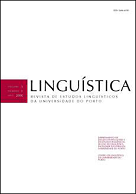Prepositioned locatives in subject position: a possible contribution from Bantu languages to the syntax of Brazilian Portuguese
Abstract
We observe the existing contrast between Brazilian and European Portuguese in relation to prepositional locatives in embedded sentences, and we argue that those constituents can occupy the grammatical subject position in transitive sentences in Brazilian Portuguese. After examining the so-called locative inversion (in which a non-argumental locative constituent may be in subject position) found in various languages, we focus on the cases of the construction in the Bantu languages, since some of them were spoken by the majority of slaves brought to Brazil between the 16th and 19th centuries. We suggest that the Brazilian Portuguese innovations are the result of the Portuguese used as a second language by Bantu languages native speakers. The possibility for a locative to be pre-verbal and agree with the predicate in those languages combined with the impoverishment of the inflectional paradigm present in the primary linguistic data generated ambiguity for the child acquiring Portuguese as her first language. The pre-verbal locative phrase, which was in a peripheral position in Portuguese, is reanalized as possible in the position of grammatical subject in Brazilian Portuguese.
References
Avelar, J. 2006. Adjuntos Adnominais Preposicionados no Português Brasileiro. Tese de Doutoramento. Instituto de Estudos da Linguagem – Universidade Estadual de Campinas.
Avelar, J. 2008 [forthcoming]. On the Emergence of TER as Existential Verb in Brazilian Portuguese. A sair em: P. Crisma; G. Longobardi (Eds.). Historical Syntax and Linguistic Theory. Oxford: Oxford University Press.
Avelar, J; Cyrino, S; Galves, C. 2008. Locative inversion and agreement patterns: some parallelisms between Brazilian Portuguese and Bantu languages. Apre- sentado durante o Special Wocal 6 (World Congress of African Linguistics), realizado em agosto/2008 na Universidade de São Paulo.
Baker, M. 2003. Agreement, Dislocation, and Partial Configurationality. In: A. Carnie; H. Harley; M. Willie (Eds.). Formal Approach to Function. Amster- dam: John Benjamins, 107-134.
Bresnan, J; Kanerva, J. 1989. Locative Inversion in Chicheŵa. Linguistic Inquiry. 20: 1-50.
Callou, D.; Avelar, J. 2003. Estruturas com “ter” e “haver” em anúncios do século XIX. In: T. Alkmim (Ed.). Para a história do português brasileiro – Vol. III. São Paulo: Humanitas-USP, 47-68.
Chomsky, N. 1995. The Minimalist Program. Cambridge MA: The MIT Press.
Chomsky, N. 2000. Minimalist Inquiries: The Framework. In: R. Martin; D. Michaels; J. Uriagereka (Eds.). Step-by-step: essays in minimalist syntax in honor of Howard Lasnik. Cambridge MA: The MIT Press, 89-155.
Chomsky, N. 2001. Derivation by Phase. In: M. Kenstowicz (Ed.). Ken Hale: A life in language. Cambridge MA: The MIT Press, 1-52.
Demuth, K.; Mmusi, S. 1997. Presentational focus and thematic structure in comparative Bantu. Journal of African Languages and Linguistics. 18: 1–19.
Duarte, E. 1995. A perda do princípio ‘Evite Pronome’ no português brasileiro. Tese de Doutoramento. Instituto de Estudos da Linguagem – Universidade Estadual de Campinas.
Fernandez-Soriano, O. 1999. Two types of impersonal sentences in Spanish: locative and dative subjects. Syntax. 2(2): 101-140.
Franchi, C.; Negrão, E.; Viotti, E. 1998. Sobre a gramática das orações impessoais com Ter/Haver. D.E.L.T.A. 14: 113-140.
Ferreira, M. 2000. Argumentos nulos em português brasileiro. Dissertação de Mestrado. Instituto de Estudos da Linguagem – Universidade Estadual de Campinas.
Figueiredo Silva, M. C. 1996. A posição sujeito no português brasileiro. Campinas SP: Editora da Unicamp.
Galves, C. 1996. O enfraquecimento da concordância no português brasileiro. In: I. Roberts; M. Kato (Eds.). Português brasileiro – Uma viagem diacrônica. Campinas SP: Editora da Unicamp, 387-408.
Galves, C. 2001. Ensaios sobre as gramáticas do português. Campinas SP: Editora da Unicamp.
Gonçalves, P.; Chimbutane, F. 2004. O papel das línguas Bantu na gênese do português de Moçambique: o comportamento sintáctico de constituintes locativos e direccionais. Papia. 14: 7-30.
Kato, M. 2000. The Partial Prodrop Nature and the Restricted VS Order in Brazilian Portuguese. In: M. Kato; E. Negrão (Eds.). The Null Subject Parameter in Brazilian Portuguese. Frankfurt: Vervuert – Latino-Americana, 223-258.
Levin, B.; Rappaport Hovav, M. 1995. Unaccusativity: at the Syntax-Lexical Semantics Interface. Cambridge MA: The MIT Press.
Lipsky, J. 2007. Afro-Yungueño Speech – The long-lost black Spanish. Spanish in Context. 4(1): 1-43.
Marten, L. 2006. Locative inversion in Otjiherero: more on morphosyntatic variation in Bantu. ZAS Papers in Linguistics. 43: 97-122.
Mendikoetxea, A. 2006. Unergatives that ‘become’ unaccusatives in English loca- tive inversion: a lexical-syntactic approach. In: C. Cop; L. Gournay (Eds.). Point de Vue sur l’Inversion. Cahiers de Recherche en Grammaire Anglaise de l’Énonciation. Tome 9. Paris: Editions Orphys, 133-155.
Mok, S. 1992. Locative inversion in Cantonese. In: Kansas Working Papers in Linguistics. 17: 115-157.
Negrão, E. V.; Viotti, E. 2008. Estratégias de impessoalização no português brasi- leiro. In: M. Petter; J. L. Fiorin (Eds.). África no Brasil: a formação da língua portuguesa. São Paulo SP: Contexto, 179-203.
Martins, A; Nunes, J. 2008 [forthcoming]. Syntatic Change as Chain Reaction: the Emergence of Hyper-Raising in Brazilian Portuguese. A sair em: P. Crisma; G. Longobardi. (Eds.). Historical Syntax and Linguistic Theory. Oxford: Oxford University Press.
Petter, M.; Fiorin, J. L. (Eds., 2008). África no Brasil: a formação da língua por- tuguesa. São Paulo SP: Contexto, 179-203.
Roberts, I. 2007. Diachronic Syntax. Oxford: Oxford University Press.
Roberts, I; Roussou, A. 2003. Syntatic Change: a Minimalist Approach to Grammaticalization. Cambridge: Cambridge University Press.
Rodrigues, C. 2002. Morphology and Null Subjects in Brazilian Portuguese. In: D. Lightfoot (Ed.). Syntatic Effects of Morphological Changes. Oxford: Oxford University Press, 160-178.
Salzmann, M. 2004. Theoretical Approaches to Locative Inversion. Dissertação de Mestrado. Philosophical Faculty of the University of Zurich.
Downloads
Published
Issue
Section
License
Copyright (c) 2018 Linguística Revista de Estudos Linguísticos da Universidade do Porto

This work is licensed under a Creative Commons Attribution-NonCommercial 4.0 International License.



